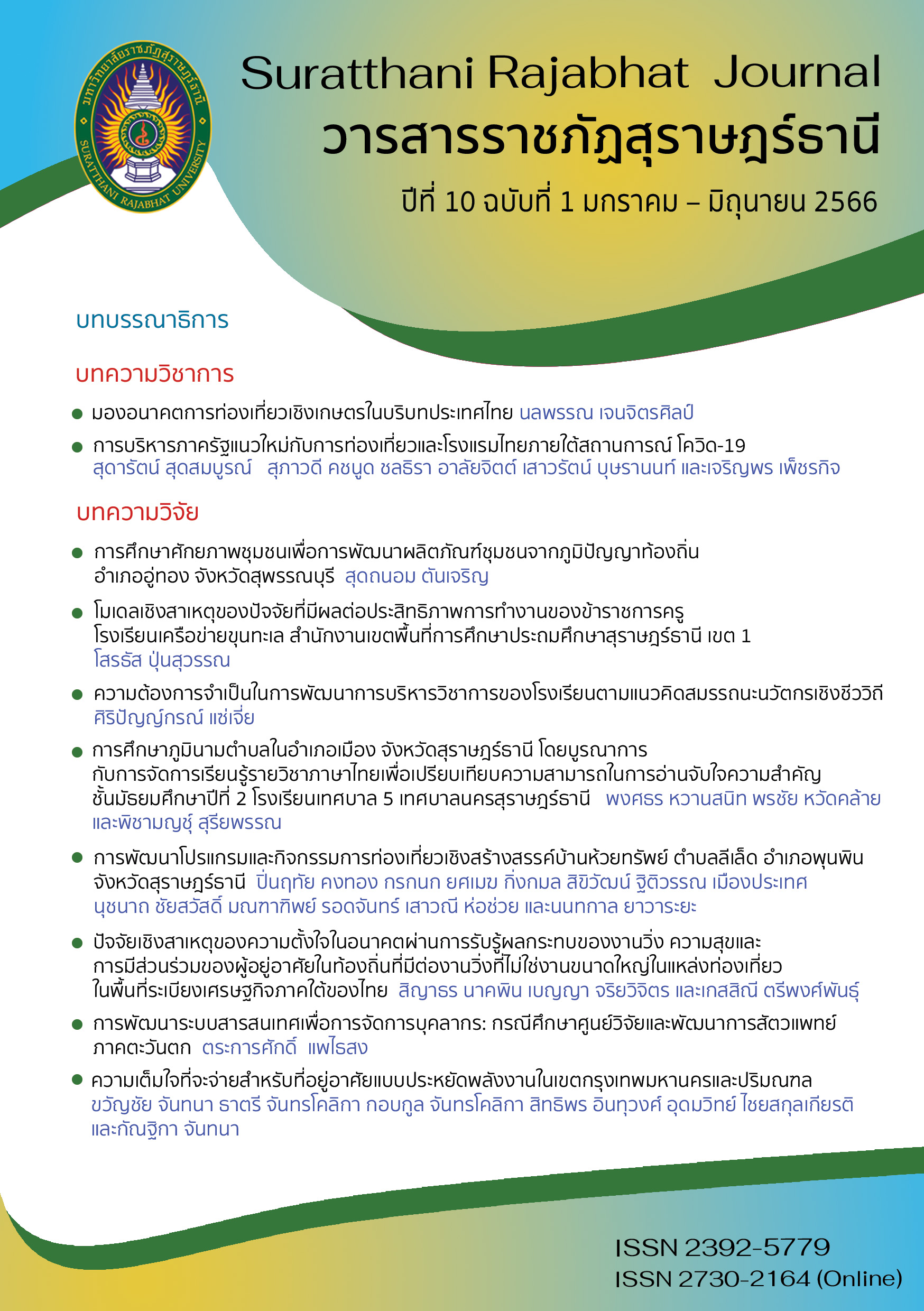A Need Assessment of Developing Academic Management of School Based on the Concept of Biocultural Innovator Competencies
Main Article Content
Abstract
This research aimed to study the priority need in academic management of participated schools in teacher & school quality program (TSQP) based on the concept of biocultural innovator competencies by the same framework. This research was conducted with a Quantitative Research approach. The sample group compromised participated schools in TSQP under Surat Thani Primary Educational Service Area Office 1 and 2, totaling 4 school by purposive sampling The informants consisted of 57 people including school administrators and teachers who were randomized by using the sample sampling method. The research instrument used in this research was rating-scaled questionnaire, and 100% of the questionnaire was returned. The data were analyzed through mean, standard deviation, and PNImodified.
The results showed that 1) the highest priority need of Academic management was (1) coordination in academic development with others educational institutions and organizations (2) learning management (3) measurement and evaluation (3) using of media, innovation, technology for education and learning resources and (5) curriculum development, respectively. 2) the highest of priority need of biological innovator competencies was (1) knowledge of Eco-Technology (2) ability to conserve biodiversity (3) ability to reduce the risk (4) ability to Create Green Innovation (5) creative thinking (6) integrating scientific and indigenous knowledge and (7) Ability to Adapt, respectively. The overall priority was 0.128 (PNIModified = 0.128). The overall current states and desirable states in academic management based on the concept of biocultural innovator competencies were at a high level (𝑥̅ = 3.97) and a high level (𝑥̅ = 4.47), respectively.
Article Details

This work is licensed under a Creative Commons Attribution-NonCommercial-NoDerivatives 4.0 International License.
References
Chaemchoy, S. (2020).Secondary School Management Innovation for Creating Innovartors. Journal of Education Naresuan University, 22(2), 193-213. https://so06.tci-thaijo.org/index.php/edujournal_nu/article/view/238013/164166.
Department of Education and Training. (2018). How are schools funded in Australia?. https://education.vic.gov.au/Pages/default.aspx.
Department of Environmental Quality Promotion. (2014). Eco-School: Sharing and Learning Together. Ministry of Natural Resources and Environment, Thailand, 3 – 84.
Education Sandbox. (2021). Biological innovators Learning towards a sufficiency way", the competency base curriculum of Wat Ta Khan School Educational Innovation Area, Rayong Province. https://www.edusandbox.com/6th-aug-2021-1-wattakhan-school/.
Equitable Education Fund. (2020). Annual Report 2020. https://www.eef.or.th/wp-content/uploads/2021/03/EEF-Annual-63-Page-Preview-031021-Final-compressed.pdf.
European Commission. (2016). Science for Environment Policy": European Commission DG Environment News Alert Service, edited by SCU. The University of the West of England, Bristol.
Hemmelskamp, J. (1997). Environmental Policy Instruments and their Effects on Innovation. European Planning Studies, 5(2), 177–194. https://doi.org/10.1080/09654319708720392.
Kaewurai, W. (2021). Curriculum Development: From Theory to Practice. Naresuan University Publishing House, Thailand, 366.
Larbaudomkarn, L. (2021). Export Turning Point When the World Started Not Interested in Thailand Anymore on July.
Linruesri, P. (2021). A Comparison of Learning Achievements Using Video Teaching Media on Origin and Development of Petroleum Fields For students in the field of automotive work. http://online.lannapoly.ac.th/Research/FileUpload/20150204_144655.pdf.
Macura, B., Piniewski, M., Ksiezniak, M., Osuch, P., Haddaway, N. R., Ek, F., Anderson, K. & Tattari, S. (2019). Effectiveness of ecotechnologies in agriculture for the recovery and reuse of carbon and nutrients in the Baltic and boreo-temperate regions: a systematic map. Environmental Evidence, 8(1), 39. https://environmentalevidencejournal.biomedcentral.com/articles/10.1186/s13750-019-0183-1.
National Science and Technology Development Agency. (2013). Science, Technology and Innovation for Sustainable Development. http://waa.inter.nstda.or.th/stks/pub/2014/20140404-sustainable-development.pdf.
Paripunnunggurn, P. (2011). Instructional Leadership of School Administrators as Perceived by Teachers under the Jurisdiction of Narathiwat Primary Educational Service Area Office II. Faculty of Education (Educational Administration), Prince of Songkla University. http://kb.psu.ac.th/psukb/handle/2010/8156.
Prasertmuang, D. & Chunpetch, A. (2016). The development of assessment and measurement toolof clinical skills with Objective Structure ClinicalExamination (OSCE) for students of Nursing college under the Praboromarajchanok Institute. Journal of Nursing and Education, 9(3), 95-111.https://he01.tci-thaijo.org/index.php/JNAE/article/view/68295/57497.
Puranachot, T. (1997). Integrated Teaching: An Expert's Perspective]. Journal of HR intelligence, 3(6), 15-16.
Siribanpitak, P. (2010).Educational Management for Sustainable Development: Economic, Social and Environmental Education Fundamentals. Thai Sam Bhand Press, Thailand.
Siridhrungsri, P. (2019). mobilization of resources for education. Graduate School, Dhurakij Pundit University.
Sriswasdi, T. (2012). The Educational Measurement and Evaluation Administration and The Performance of Assessment Mission on Student’s Learning of Schools in Nakhon Pathom Province Under The Jurisdiction of The Secondary Educational Service Area Office 9. Graduate School, Silpakorn University.
Swiderska, K., Argumedo, A., Song, Y., Rastogi, A., Gurung. N & Wekesa, C. (2018).Biocultural innovation: the key to global food security. https://www.iied.org/17465iied.
TC Global (2011). Ecotechnology: For the Present and the Future. https://tcglobal.com/ecotechnology-for-the-present-and-thefuture/.
Vanichbuncha, K. (2017). Advanced Statistical Analysis with SPSS for Window. 3 Lada Limited Partnership.
Wongwanich, S. (2015). Needs Assessment Research is Needed. Chulalongkorn University Press, Thailand.
Wattananarong, K. (2011). Innovation and technical education technology. Textbook Publishing and Digital Publication Center King Mongkut's University of Technology North Bangkok.


